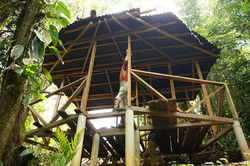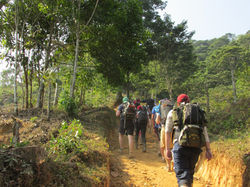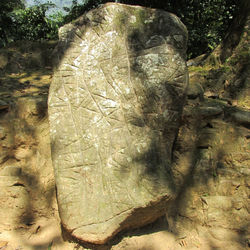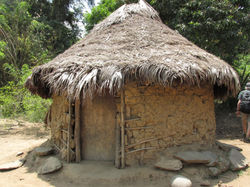
/projects.
/about.
/contact.
workshop. Baño Seco Ciudad Perdida / Dry composting toilet at Lost City.
fecha. 2015.
lugar. Ciudad Perdida, Sierra Nevada Santa Martha, Colombia.
director de workshop. Antropólogo Santiago Giraldo.
equipo de profesores. Arq. Carlos Hernández / Arq. Daniel Nadal
aliados. ICANH (Colombian Institute of Anthropology and History).


KEYWORDS heritage, social innovation, construction, multidisciplinary, accessibility.
The PEI - International Studies Program from the School of Architecture and Design of the Pontificia Universidad Javeriana from Bogotá, has been working since 1996, with the objective and making efforts to develop strategies and projects that go beyond the classroom, the PEI understands the necessity of developing projects with the students that are connected with the social, spatial, political, environmental and cultural reality, by considering its surroundings, as well as encouraging a sensibility towards society, and a coherence in developing proposals that go from the territory to the technical details; architectural and urban proposals at multidisciplinary scales, using the Collective Intelligence strategy by producing big impact -small scale interventions. The PEI has worked on national and international projects, workshops and courses.
The PEI organized a Workshop at Lost City, Sierra Nevada Santa Martha and Palomino, La Guajira, Colombia; in collaboration with ICANH (Colombian Institute of Anthropology and History) team, and with the Anthropologist Santiago Giraldo the Director of Heritage Colombia as workshop director.









The Lost City is located at Sierra Nevada Santa Martha, close to Buritaca river, in a humid and mild climate, is one of the main archeological places in Colombia, and a unique characteristic is the accessibility because is challenging, you can only get there by feet or a donkey and it takes from 2 to 3 days walking; on the road we had the opportunity visit some Kogi communities that live in the mountain range.
Also the anthropological research in the area has allowed archeologist to reconstruct important aspects from prehispanic cultures. They are a proof of the engineering and architectural sophistication techniques on stones, which includes terraces, bridges, stairs and canals.



The Pei worked for 5 years in the community of Palomino, La Guajira, Colombia, close to Sierra Nevada Santa Martha, on a project called "Palomino, Society Under Construction" with different projects and workshops about social innovation.
A community close to the ocean with many difficulties like clean water access and violence. The main outcomes during the years of work there where projects on: social appropriation and social innovation like: constructing dry composting toilets or “green machine artifacts” on different parts of the community, some of them in public spaces and others on private homes to encourage the inhabitants to adopt this kind of technologies, which the community engaged to take care of them, the PEI also worked and built a “Casa de los deportes” and a “Casa de la Cultura”, all these projects where constructed with the Palomino community and the PEI students and teacher. This is why they PEI was invited to developed a project on Lost City about a Dry composting toilet.









The first part of the workshop was about students getting involved into small scale-big impact interventions on Palomino Community on the “Casa de la Cultura” through the Collective Intelligence methodology; the PEI has always shown a commitment with the communities we have work with.
The objective of the workshop was to immerse the students into a real-life project, so they could be able to develop a social and sustainable sensitivity towards the Colombian communities, as well as the accessibility subject when designing, which means the transportation of materials, the costs and efforts that imply not to use local materials. Being local is one the objectives that the PEI aims on its projects.
This workshop also involded the students to have the disposition to make an effort, a physical effort to get there, like many places here in Colombia, where the accessibility is not easy.
The students made a design proposal with a social and sustainable innovation impact and with the capacity to be built on a week by the team. By understanding the reality of the country and finding ways to generate community through the design and the construction of the Dry Composting toilet. Learn-by-doing, is also a methodology the PEI used on this workshop.
The Workshop was a compliment for the semester`s subject which was: Cultural Sensitive Housing Project. Where the PEI proposal is to encourage students to make social innovation through the projects as well as to rescue and use local and traditional materials for construction that has been undervalue when the concrete showed up.

 |  |  |  |  |  |
|---|
 |  |  |  |  |  |
|---|---|---|---|---|---|
 |  |  |  |  |  |
 |  |  |  |  |  |
 |  |  |  |  |  |
 |  |  |  |  |  |
 |
Bamboo-guadua angustifolia has excellent sustainable and seismic-resistant qualities. Which has been used on different projects done by the PEI.
And on a multidisciplinary effort with the School of Engineering, the PEI had the opportunity to test on the Lab Materials the guadua, which is an endemic plant of Colombian tropical regions.
The PEI believes in the potential of this plant used for architectural projects, because is sustainable and benevolent, from the sowing to the harvest if well managed.
The feedback from the students about this semester and the Workshop was incredible.



